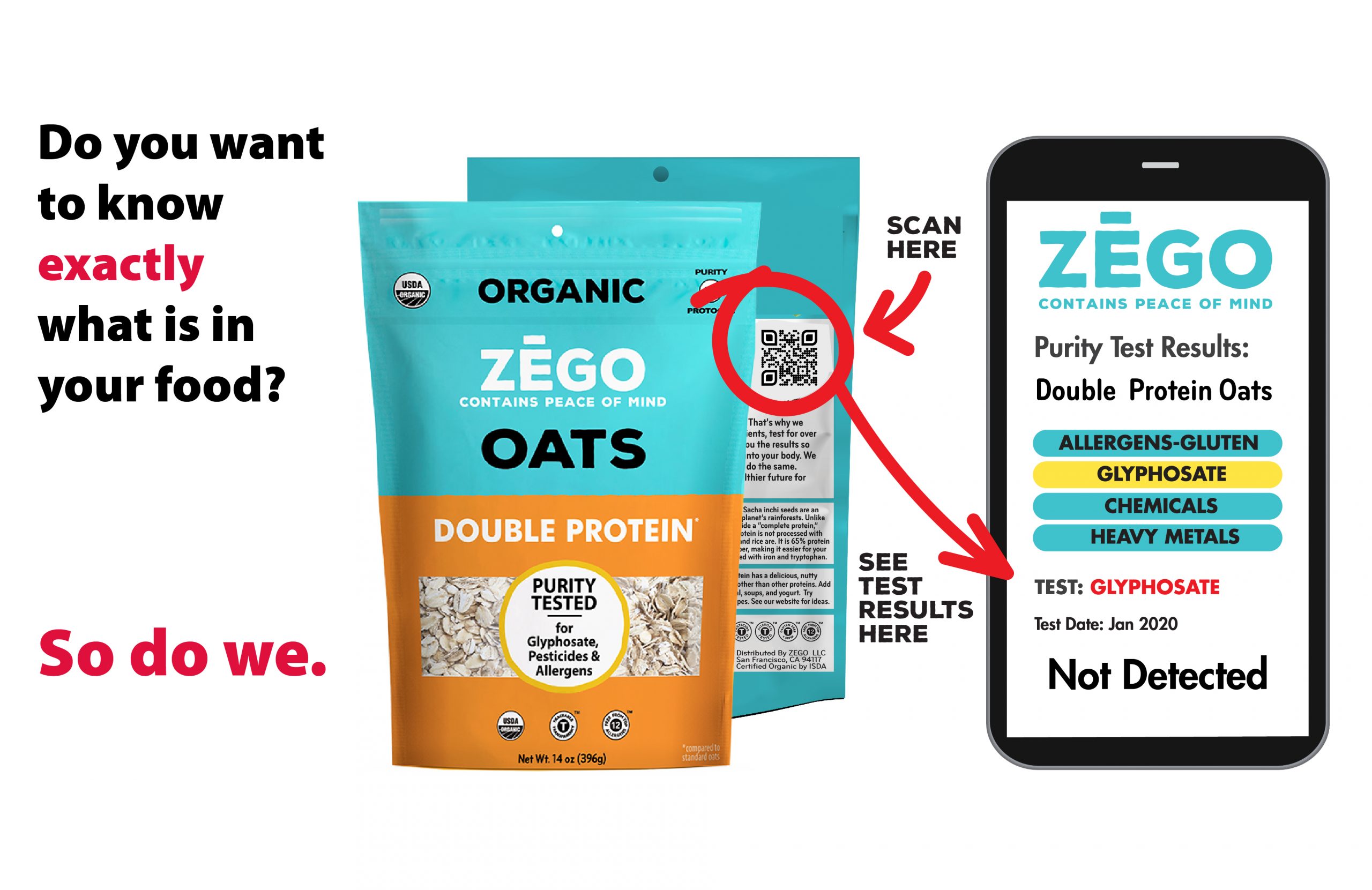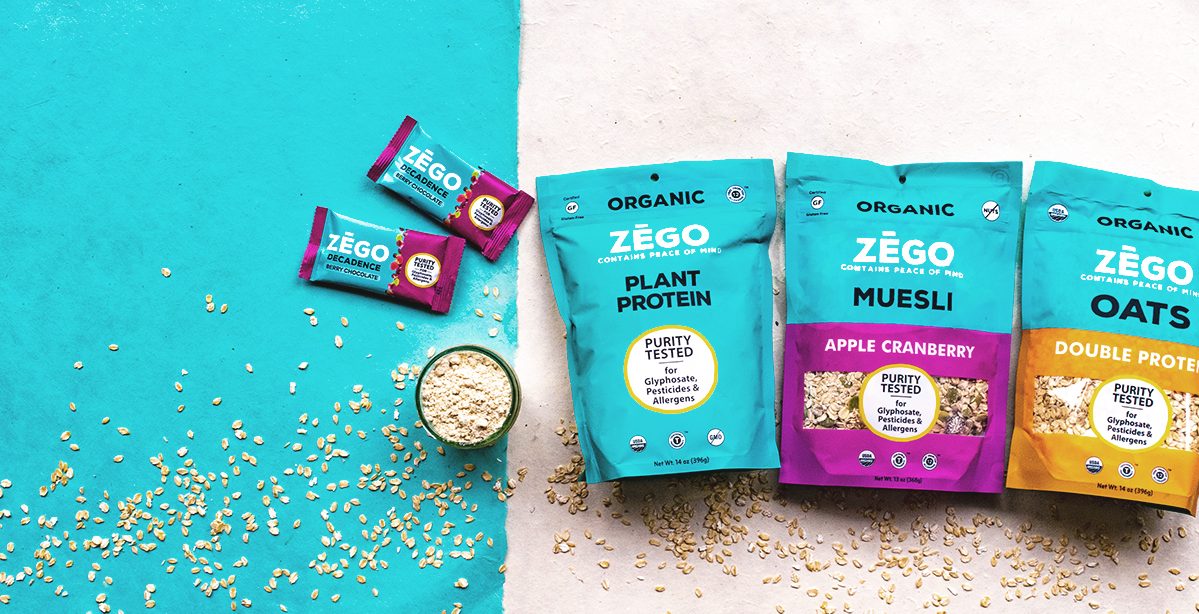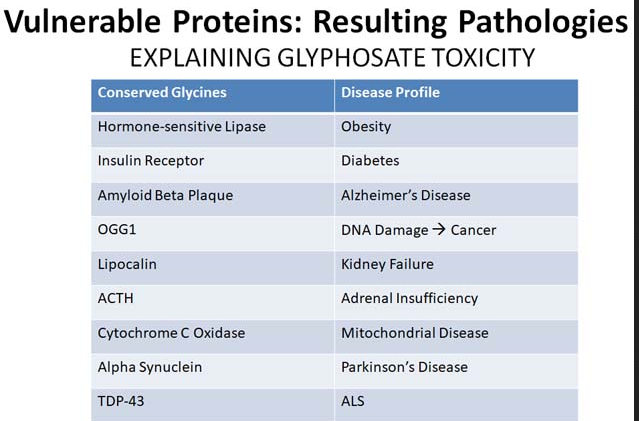Last Updated on June 17, 2022 by Colleen
About this series. There is a lot of conflicting information about glyphosate dangers in the marketplace, glyphosate toxicity to the earth, and the link between glyphosate and cancer, gut health and fertility. As a food manufacturer and a B Corporation working to detoxify our global food supply chain and are deeply concerned about toxins like this used on crops. If you are new to learning about glyphosate, we encourage you to start with the first post What is Glyphosate. Regardless of where you start reading, we aim to provide you valuable and actionable knowledge. Above all, we hope you’ll share the information with your friends too. Together, we can bring about a cleaner world.

Is Glyphosate Dangerous to Human Health?
Glyphosate herbicide, the main chemical in Round Up and most all commercial weed killers, is just one of over 400 agricultural chemicals we test our products for at ZEGO. However, it is the most popular, not just in the U.S., but the entire world.
Glyphosate dangers are well documented in humans, animals, and the earth. Yet, other studies by scientists largely funded by the herbicide’s maker Monsanto assert it is not toxic. As a result, it the most controversial and talked about weedkiller on the market.
What Does the Research Say?
There are many studies showing alarming links between glyphosate and disease, including our rising infertility rates. To be sure, we need more research, as many of these studies are small or use large amounts of exposure. But such small studies and other scientific hypotheses are the building blocks of scientific knowledge. And, our response to them should be that we want more research, NOT that they are too small to be considered.

Why isn’t there more research on glyphosate toxicity? Consider this: Monsanto introduced glyphosate to the market through its product Round Up. Over the past few decades, Monsanto donated generously to university research and to politicians. The result (and purpose) was to influence and dampen research on glyphosate dangers and their product. And, observers accuse the EPA of being a revolving door for Monsanto connected employees. To see the impact this has had, just look at the data the EPA collected for decades on annual industrial chemical use. Notably, you will find the EPA has not included been tracking glyphosate use. Yes, for decades, the EPA didn’t track the use of the most common agricultural chemical in the world.
ZEGO’s Approach
In light of all this, we find plenty of reasons to be concerned about glyphosate toxicity. In coming to this view, we look to the work of Dr. Zach Bush, the Environmental Working Group, the International Agency for Research on Cancer (IARC) of the World Health Organization, Dr. Stephanie Seneff, and other sources we trust.
So, we are going to steer away from the ‘battle of the studies’ and Round Up cancer lawsuits (feel free to look those up and dive down the rabbit hole). Instead, we are going to look into the science of how glyphosate may behave in your body to see how it can cause – or clear the path for – diseases ranging from IBS to diabetes to cancer.

Why Did Scientists Think Glyphosate Was Safe?
When glyphosate was invented by scientists at Monsanto, they thought glyphosate toxicity would not be a problem for humans. You see, glyphosate kills weeds because it interferes with their photosynthesis process. So, they figured that because people don’t photosynthesize, we wouldn’t be affected by the chemical. But what they didn’t know is that the healthy bacteria in our gut and other microbes use the same process that glyphosate disrupts (a chemical process known as the shikimate pathways). It also may be damaging protein synthesis. Additionally, glyphosate likely acts as an antibiotic, killing off susceptible bacteria that your gut needs to support your health.
What Are Glyphosate Dangers for Your Microbiome?
How much of your microbiome is threatened by glyphosate? Notably, one Finnish research group at the University of Turku in Finland estimates that over 50% of the most common human gut bacteria could be harmed.
Their work is based on bee microbiome research showing how glyphosate may contribute to the dangerous decline in our honeybee population. And, the reasons are wide-ranging. Bees exposed to glyphosate toxicity and the gut damage it causes are more likely to succumb to bacterial infection when exposed. Moreover, they also grow more slowly, die earlier, and have trouble finding their way back to the hive.

How Does Glyphosate Harm the Nutrients in Food?
Compounding this, glyphosate dangers include damage to the photosynthesis of food even if it isn’t sprayed with the chemical, through its contamination of water, air, and soil. And, though the residue may be small, according to Dr. Zach Bush, it interferes with the complex growing process that builds nutrients in your food. Consequently, even if you are eating a healthy, plant-based diet, those plants may not be as nutritious as they used to be. In summary, not only does glyphosate harm your health, but it also decreases the healthfulness of the food you eat.
How Does Glyphosate Behave in Your Body?
Glyphosate is similar in structure to one of your essential amino acids, glycine. You may remember from high school science class that we need glycine to form proteins. And, we need proteins for cellular growth, repair, and detox. Unfortunately, glyphosate has a shape that allows it to bind to protein-building receptors intended for glycine. If glyphosate takes the spot intended for glycine, the protein will be incomplete. And, unfortunately, incomplete proteins are unable to perform their function of building and maintaining health.

Unfortunately, that’s just the start of the damage that may be caused by glyphosate. According to Dr. Zach Bush, glyphosate damages your thin gut lining, allowing undigested food outside your gut. This is referred to as “leaky gut.” In short, in a one-two punch, glyphosate causes leaky gut and impairs your ability to repair it. We encourage you to follow Dr. Bush and others like Dr. Will Bulsiewicz and Dr. Stephanie Seneff to learn more and follow this journey of scientific discovery.
What Other Health Problems May Glyphosate Toxicity Be Linked To?
Glyphosate dangers for the human body read like a list of side effects for the drugs you see advertised on TV. For sure, it has a strong link to non-Hodgkins Lymphoma. You’ve undoubtedly seen the class action lawsuits ads for what some are calling “Round Up cancer.” Bayer is the parent company that owns Round Up after purchasing it from Monsanto. Bayer has settled tens of thousands of lawsuits for over $10 billion from consumers asserting glyphosate contributed to their cancer. In fact, the first jury verdicts was for a gardener in California for close to $300 million.
But glyphosate and cancer is just the start. Because of its impairment on protein formation and function, and the direct damage it can cause to your gut lining, glyphosate is associated with a myriad of health problems. This includes obesity, diabetes, food allergies and intolerances, Inflammatory Bowel Syndrome (IBS), Alzheimer’s and Parkinson’s, kidney failure, ALS, mitochondrial disease, liver disease, and infertility. Note that we will blog more on some of these specific diseases and their links to toxins in the future because many toxins contribute to them, including heavy metals like arsenic.

More Articles on Glyphosate
Given how widely this chemical is used, we need to examine the full impact it has on human and planetary health and more than just the glyphosate cancer link. Being realistic, we recognize that in our busy lives, ost of us only have a few minutes to spend on an article. So, we will be publishing all this juicy content on glyphosate in a short pieces across this Winter (January/February 2021). Our goal is to help you efficiently fill in any knowledge gaps you may have regarding this toxic chemical.
- What Health Problems are Associated with Glyphosate? From the Glyphosate Cancer Link and Beyond
- Why Does it Matter to the Earth and People that Glyphosate is Water Soluable?
- How is Glyphosate Related to Food Allergies, Intolerances?
- Where is Glyphosate Banned and Why Isn’t it Banned in the U.S.?
- Why Won’t a Ban on Glyphosate Alone Won’t Solve the Big Problem of our Chemical World?
- How Can you Avoid Glyphosate in Your Food, Water, and Life?
- How Can You Be Effective in Advocating for a Cleaner Food Supply Chain?
Send Us Your Questions!
Please, let us know if you have other questions you would like answered about glyphosate by emailing us at info@zegofoods.com.
Additionally, here are some links for further information:
https://www.epa.gov/ingredients-used-pesticide-products/glyphosate
https://www.fda.gov/food/pesticides/questions-and-answers-glyphosate
Colleen Kavanagh is the founder and CEO of ZEGO, a company that seeks to inspire changes in the food system so it better nourishes all people and our planet. She spent 20 years working to better nourish low-income children through improved public policies and programs, working for Congressman George Miller in Washington, DC and various anti-hunger nonprofits. She founded the nonprofit www.abettercourse.org. In 2013, she decided the only way to better nourish the most vulnerable is to leverage consumer demand through the marketplace to regenerating the food system and protect the most vulnerable. And that, lead to her starting ZEGO.
